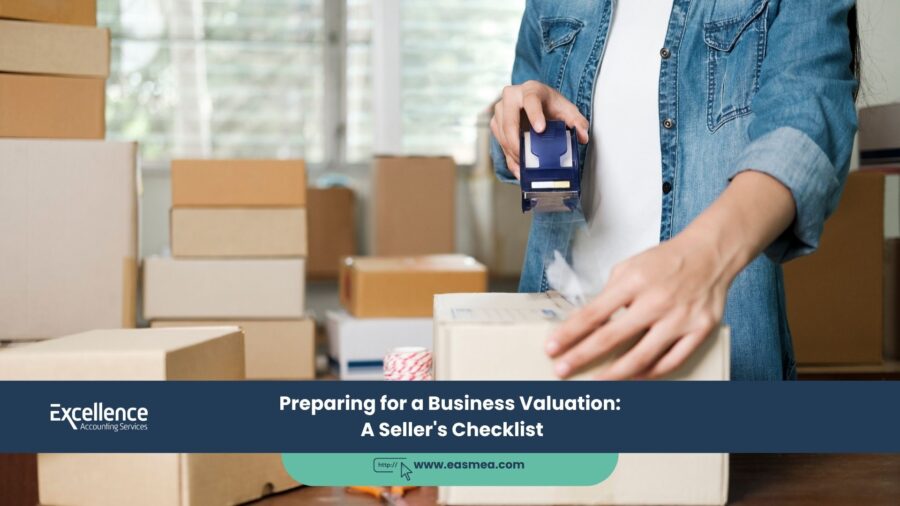Preparing for a Business Valuation: A Seller’s Checklist
For a business owner in the UAE, the decision to sell your company is one of the most significant financial moments of your life. The culmination of your years of hard work, risk, and dedication will be crystallized into a single number: your business valuation. But this number is not set in stone. It is heavily influenced by the health, organization, and perceived risk of your business. The process of maximizing your company’s value doesn’t start when you hire a broker; it starts months, or even years, earlier with meticulous preparation.
- Preparing for a Business Valuation: A Seller's Checklist
- The Seller's Valuation Preparation Checklist
- Financial Preparation Checklist
- Legal & Corporate Housekeeping Checklist
- Operational Readiness Checklist
- Commercial & Strategic Positioning Checklist
- Maximize Your Exit Value with EAS Sell-Side Advisory
- Frequently Asked Questions (FAQs) for Sellers
- Know Your Worth. Maximize Your Exit.
A business valuation is an objective assessment of a company’s worth. When conducted for a sale, it forms the basis of the asking price and the anchor for negotiations. A well-prepared company—one with clean financials, clear legal standing, and smooth operations—will invariably command a higher valuation than a disorganized one. Preparation reduces the perceived risk for a buyer, increases their confidence, and allows them to see the true potential of the business, all of which translate into a higher selling price.
This guide serves as a comprehensive checklist for sellers. It outlines the crucial steps you need to take to prepare your business for a formal valuation. By systematically working through these areas, you can ensure that when the valuator begins their work, they see your business in its best possible light, ready to command its maximum potential value.
Key Takeaways
- Preparation Maximizes Value: The work you do before a valuation has a direct and significant impact on the final selling price.
- Clean Financials are Non-Negotiable: Your top priority is to have several years of clean, accurate, and preferably audited financial statements.
- Reduce Owner Dependency: A business that can run smoothly without your daily involvement is inherently more valuable and less risky to a buyer.
- Organize Your Legal House: Ensure all contracts, licenses, and corporate documents are up-to-date and readily available. A messy legal structure is a major red flag.
- Craft a Growth Story: A valuation is forward-looking. Be prepared to present a credible, data-backed story for the company’s future growth potential.
- Engage Professionals Early: Working with a CFO advisor and valuation expert well in advance of a sale is a critical strategic move.
The Seller’s Valuation Preparation Checklist
Think of this as your roadmap to getting “sale-ready.” Each item you check off strengthens your position and adds potential value to your business.
Financial Preparation Checklist
This is the most critical area. Buyers and their valuators will spend most of their time scrutinizing your numbers.
- Get Your Books in Order: Ensure you have at least 3-5 years of clean, accurate financial statements (P&L, Balance Sheet, Cash Flow). All transactions must be properly recorded in a robust accounting system like Zoho Books.
- Conduct a Professional Audit or Review: Having your financials audited or reviewed by an external accounting firm lends immense credibility and reduces the buyer’s perceived risk.
- Normalize Your Earnings: Identify all non-recurring and personal expenses run through the company. Be prepared to present a clear calculation of “Seller’s Discretionary Earnings” (SDE) or Adjusted EBITDA.
- Clean Up Your Balance Sheet: Write off any uncollectible accounts receivable and dispose of obsolete inventory. Settle any outstanding shareholder loans.
- Prepare Defensible Financial Projections: Develop a realistic, assumption-driven financial forecast for the next 3-5 years. This forms the basis of the Income-Based business valuation.
- Organize Tax Records: Ensure all your VAT returns and Corporate Tax filings are up-to-date and all payments have been made. Have copies ready for review.
Legal & Corporate Housekeeping Checklist
A clean legal structure gives buyers confidence that they are not inheriting hidden liabilities.
- Review and Organize Corporate Documents: Ensure your trade license, Memorandum of Association, and all other company formation documents are current and in order.
- Verify Your Cap Table: Confirm that your shareholding structure is accurately documented and all share certificates are in place.
- Organize All Key Contracts: Create a file (a “data room”) with all critical contracts, including customer agreements, supplier contracts, real estate leases, and equipment leases.
- Review Employment Agreements: Ensure you have signed contracts for all employees and that you are in full compliance with UAE Labour Law.
- Secure Your Intellectual Property (IP): Confirm that all trademarks, patents, and copyrights are legally registered in the company’s name, not in an individual’s name.
Operational Readiness Checklist
This section focuses on making the business as attractive and easy to transition as possible for a new owner.
- Document Key Processes: Create Standard Operating Procedures (SOPs) for all critical business functions. This proves the business is a system, not just a collection of people.
- Reduce Owner Dependency: This is crucial. Delegate key responsibilities and ensure the business can operate efficiently without your daily hands-on involvement. A business that depends entirely on its owner is very difficult to sell.
- Strengthen Your Management Team: Empower your key managers. A strong second-tier management team is a huge asset that a buyer can inherit.
- Assess Your Physical Assets: Repair or replace any critical equipment that is in poor condition. A clean and well-maintained facility makes a strong impression.
- Clean Up Your Facility: A tidy, organized office, warehouse, or retail space demonstrates professionalism and care.
Commercial & Strategic Positioning Checklist
This is about crafting the narrative of your business’s future potential.
- Diversify Your Customer Base: If too much of your revenue comes from one or two clients, the business is seen as risky. Work to reduce customer concentration.
- Develop a Clear Growth Strategy: Don’t just present historical data. Prepare a compelling and realistic story about the future growth opportunities for the business.
- Enhance Your Online Presence: A professional website and positive online reviews can significantly enhance your brand’s perceived value.
- Gather Customer Testimonials: Strong testimonials and case studies provide social proof and validate your market position.
Your goal during preparation is to anticipate every question a skeptical buyer might ask and have a well-documented, credible answer ready for them. This is the essence of sell-side readiness.
Maximize Your Exit Value with EAS Sell-Side Advisory
Preparing your business for sale is a complex and time-consuming process. Excellence Accounting Services (EAS) acts as your partner, guiding you through every step to ensure you are positioned to achieve the highest possible valuation.
Our Preparation Services for Sellers:
- Indicative Business Valuation: We provide a preliminary valuation early in the process to set realistic expectations and identify key value drivers.
- Sell-Side Due Diligence Prep: We help you organize your financials, legal documents, and operations into a professional data room, identifying and fixing red flags before buyers find them. This is a crucial part of our due diligence support.
- Financial Cleanup and Reporting: Our bookkeeping and Fractional CFO services ensure your financials are clean, credible, and tell a compelling story.
- Financial Model Development: We build the defensible financial forecasts needed to support a strong valuation.
Frequently Asked Questions (FAQs) for Sellers
Focus on the key value drivers: increase recurring revenue, improve profit margins by controlling costs, reduce customer concentration, document your processes to reduce owner dependency, and build a strong management team. A track record of consistent, profitable growth is the single biggest driver of value.
SDE is a valuation metric typically used for smaller businesses. It is calculated by taking the company’s net profit and adding back interest, taxes, depreciation, amortization, the owner’s salary, and any personal expenses run through the company. It represents the total financial benefit that a single owner-operator derives from the business.
A valuation is a snapshot in time. A formal report is generally considered valid for about 12 months, provided there have been no significant changes in the business or the market. If a major event occurs, the valuation should be updated.
Generally, no. It is usually best to keep the sale process confidential until the deal is finalized. Announcing it early can create uncertainty and anxiety among staff, potentially leading key employees to leave, which would damage the business’s value.
This is the first thing you must fix. It is highly recommended to hire a professional accounting firm to perform a thorough accounting review and clean up your historical records for at least the past three years. Going to market with messy books will significantly reduce your valuation and may even make the business unsellable.
A data room is a secure online repository (like Google Drive, Dropbox, or a specialized VDR service) where you upload all the documents a potential buyer will need to review during their due diligence. Having a well-organized data room ready before you go to market shows professionalism and dramatically speeds up the sale process.
Extremely important. A buyer is acquiring not just assets, but an operating business. A strong, capable management team that can run the business without the seller is a massive asset and significantly de-risks the investment for the buyer, leading to a higher valuation.
Start delegating key responsibilities to trusted employees. Create and document standard operating procedures (SOPs) so that processes are system-dependent, not people-dependent. Empower a second-in-command. The more the business can run on its own, the more valuable it becomes.
Yes. Getting a preliminary or indicative valuation is a crucial first step. It helps you set realistic price expectations, understand what drives your company’s value, and identify areas for improvement long before you enter into a formal sale process.
This is a process where the seller hires a firm to conduct due diligence on their own company before going to market. It’s a proactive step to uncover and fix any potential issues. Presenting a clean vendor due diligence report to potential buyers can build trust, accelerate the sale process, and help defend your asking price.
Conclusion: Selling from a Position of Strength
Preparing your business for a valuation is a strategic process of transforming it from a company that is simply operating into an asset that is ready for sale. By meticulously working through this checklist, you are not just cleaning up your business; you are polishing an asset to maximize its shine. This preparation allows you to enter into negotiations not with hope, but with the confidence that comes from knowing you are representing the true and maximum value of the business you have worked so hard to build.
Know Your Worth. Maximize Your Exit.
Our sell-side advisory and valuation services are designed to get your business ready for a successful and profitable exit.




